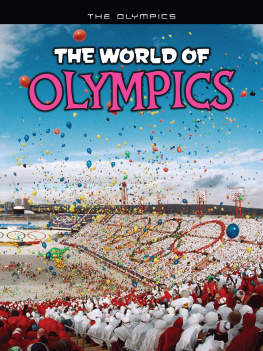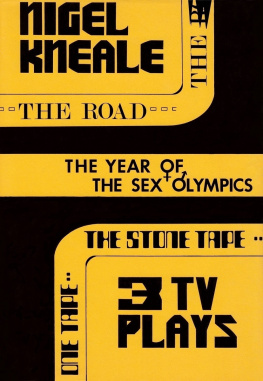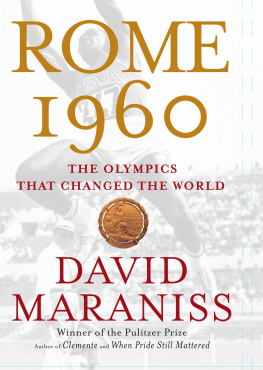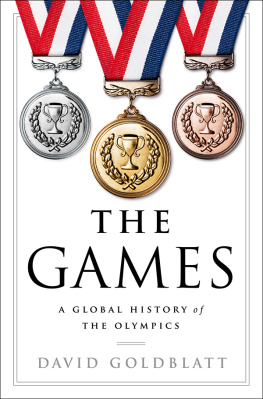David Arscott - The Olympics, A Very Peculiar History
Here you can read online David Arscott - The Olympics, A Very Peculiar History full text of the book (entire story) in english for free. Download pdf and epub, get meaning, cover and reviews about this ebook. year: 2011, publisher: The Salariya Book Company, genre: Detective and thriller. Description of the work, (preface) as well as reviews are available. Best literature library LitArk.com created for fans of good reading and offers a wide selection of genres:
Romance novel
Science fiction
Adventure
Detective
Science
History
Home and family
Prose
Art
Politics
Computer
Non-fiction
Religion
Business
Children
Humor
Choose a favorite category and find really read worthwhile books. Enjoy immersion in the world of imagination, feel the emotions of the characters or learn something new for yourself, make an fascinating discovery.

- Book:The Olympics, A Very Peculiar History
- Author:
- Publisher:The Salariya Book Company
- Genre:
- Year:2011
- Rating:5 / 5
- Favourites:Add to favourites
- Your mark:
- 100
- 1
- 2
- 3
- 4
- 5
The Olympics, A Very Peculiar History: summary, description and annotation
We offer to read an annotation, description, summary or preface (depends on what the author of the book "The Olympics, A Very Peculiar History" wrote himself). If you haven't found the necessary information about the book — write in the comments, we will try to find it.
The Olympics, A Very Peculiar History — read online for free the complete book (whole text) full work
Below is the text of the book, divided by pages. System saving the place of the last page read, allows you to conveniently read the book "The Olympics, A Very Peculiar History" online for free, without having to search again every time where you left off. Put a bookmark, and you can go to the page where you finished reading at any time.
Font size:
Interval:
Bookmark:
Title Page
THE OLYMPICS, A VERY PECULIAR HISTORY
With added medals
Written by
David Arscott
Created and designed by David Salariya
Publisher Information
First published in Great Britain in MMXI by Book House, an imprint of
The Salariya Book Company Ltd
25 Marlborough Place, Brighton BN1 1UB
www.salariya.com
www.book-house.co.uk
Digital edition converted and distributed in 2011 by
Andrews UK Limited
www.andrewsuk.com
Editors: Victoria England, Jamie Pitman
Assistant editor: Jodie Leyman
Artists: David Antram, Mark Bergin, Nick Hewetson, Mark Pepp, Gerald Wood
The Salariya Book Company Ltd MMXI
All rights reserved. No part of this publication may be reproduced, stored in or introduced into a retrieval system or transmitted in any form, or by any means (electronic, mechanical, photocopying, recording or otherwise) without the written permission of the publisher. Any person who does any unauthorised act in relation to this publication may be liable to criminal prosecution and civil claims for damages.
Every effort has been made to trace copyright holders. The Salariya Book Company apologises for any omissions and would be pleased, in such cases, to add an acknowledgement in future editions.
Visit our website at
www.book-house.co.uk
or go to
www.salariya.com
for free electronic versions of:
You Wouldnt Want to be an Egyptian Mummy!
You Wouldnt Want to be a Roman Gladiator!
You Wouldnt Want to Join Shackletons Polar Expedition!
You Wouldnt Want to Sail on a 19th-Century Whaling Ship!
Dedication
For Rosie and Beth, much loved non-Olympians.
DA
Quotes

Sport is a school of justice, democracy and human rights.
Juan Antonio Samaranch
The Olympics remain the most compelling search for excellence that exists in sport, and maybe in life itself.
Dawn Fraser
For too long the world has failed to recognise that the Olympic Games and the Olympic Movement are about fine athletics and fine art.
Avery Brundage
To anyone who has started out on a long campaign believing that the gold medal was destined for him, the feeling when all of a sudden the medal has gone somewhere else is quite indescribable.
Seb Coe
A lifetime of training for just ten seconds.
Jesse Owens

Introduction
Greek Beginnings
In 776 BC a cook named Coroebus sprinted across the finishing line at Elis in southern Greece and into the history books. Hed just become the earliest recorded Olympic champion.
If the Games had started even before that, as some historians think, they hadnt yet taken off. Our cooks 190-metre (210-yard) dash was the only event on the programme!
Over the centuries, however, the event was to blossom into a five-day extravaganza which attracted aspiring (and perspiring) athletes from well beyond Greece itself.
Mind you, there was a lot of competition across the so-called panhellenic world, with no fewer than four major tournaments on the go:
The Olympic Games
The daddy of them all, held every four years at Elis in honour of the king of the gods, Zeus. The prize was an olive wreath.
The Pythian Games
Also every four years, near Delphi and in honour of Apollo. Prize: a laurel wreath.
The Isthmian Games
Every two years, near Corinth, in honour of Poseidon. Prize: a pine wreath.
The Nemean Games
Every two years, near Nemea, in honour of Zeus. Prize: a wreath of wild celery. (Well, it was better than nothing, wasnt it?)
Although the Games began as a religious festival, they gradually turned into a rip-roaring public jamboree, culminating in a gigantic ox-roast barbecue.
The main stadium could seat 50,000 people, and the crowds who flocked into the valley at Elis were entertained by jugglersand acrobats, harangued by politicians and accosted by traders seeking a quick drachma.
Superheroes
If youll forgive a brief Greek lesson, the gymnos in the word gymnasium means naked. Take a look at ancient vases, sculptures and mosaics and youll see that the supremely fit athletes wooed their adoring crowds while performing completely in the buff.
And never mind the symbolic wreaths although the winners received no cash prizes on the day itself, they were feted like the sports stars of today, having statues erected in their honour, receiving countless perks and finding themselves with a choice of rich women to marry. Theyd arrived!
A farewell to arms
The Games were regarded as so important that there was a brief truce around the sanctuary (or Altis) every four years, with the athletes and their families being granted safe passage through the country. Was it honoured? Apparently so, because no walls were built around the site in early times. That would have been asking for big trouble anywhere else in battle-happy Greece. No weapons were allowed inside during the Games and executions were put on hold.
Men only
Its disgraceful, of course, but women (along with slaves and foreigners) were barred from taking part. Worse still, married women werent even allowed to watch and faced the death penalty if they did. Heres what the writer Pausanias had to say: As you go from Scillus along the road to Olympia there is a mountain with high, precipitous cliffs. It is called Mount Typaeum. It is a law of Elis to cast down it any women who are caught present at the Olympic games.
One thing they could do was enter a chariot in the arena, although they wouldnt be there to see it win. For the record, the first female Olympics champion of this kind (in 396 BC) was Kynisca, a sister of the king of Sparta, whose team won the four-horse chariot race. Perhaps it was some consolation that the women although only unmarried ones were allowed to take part in their own games, a series of running races called the Heraia.

Caught in the act
In 404 BC a woman called Callipateira disguised herself as a trainer so that she could watch her son perform in the Games. Unfortunately for her, she suffered a bit of an embarrassment while climbing out of the trainers enclosure. Her clothing slipped, revealing her little secret to the world at large.
It seems that the authorities spared her from the death penalty because of her familys oustanding athletic pedigree but they imposed a new rule under which all trainers, like the athletes, must always appear naked.

Getting fit
The athletes took their training very seriously, with a dedication equal to anything wed see in a 21st century gym. They were supposed to start preparing themselves months in advance and to turn up at what wed today think of as the Olympic Village several weeks before the event began. For some of them this was at the end of an exhausting journey from places as far away as Spain, Egypt and the Black Sea.
As they went through their exercises their personal trainers would use long sticks to point out any signs of an incorrect posture. The Greeks believed harmonious movement was just as important as physical strength. To make this easier they often employed flute players to aid their rhythm and tranquillity.
Next pageFont size:
Interval:
Bookmark:
Similar books «The Olympics, A Very Peculiar History»
Look at similar books to The Olympics, A Very Peculiar History. We have selected literature similar in name and meaning in the hope of providing readers with more options to find new, interesting, not yet read works.
Discussion, reviews of the book The Olympics, A Very Peculiar History and just readers' own opinions. Leave your comments, write what you think about the work, its meaning or the main characters. Specify what exactly you liked and what you didn't like, and why you think so.







